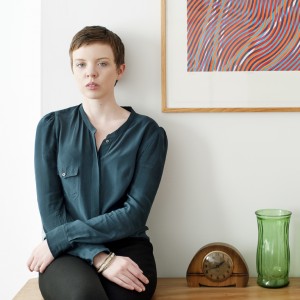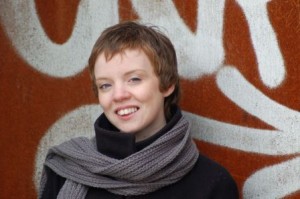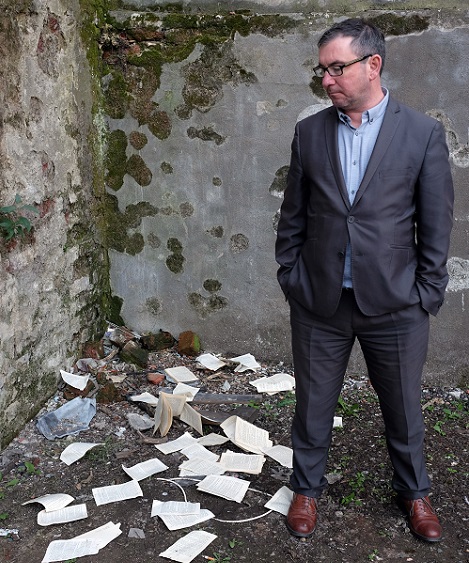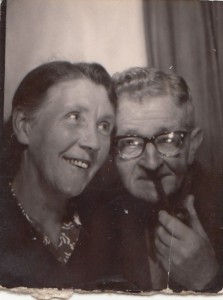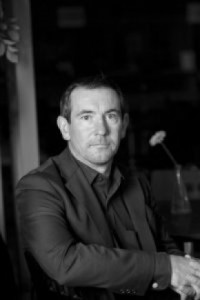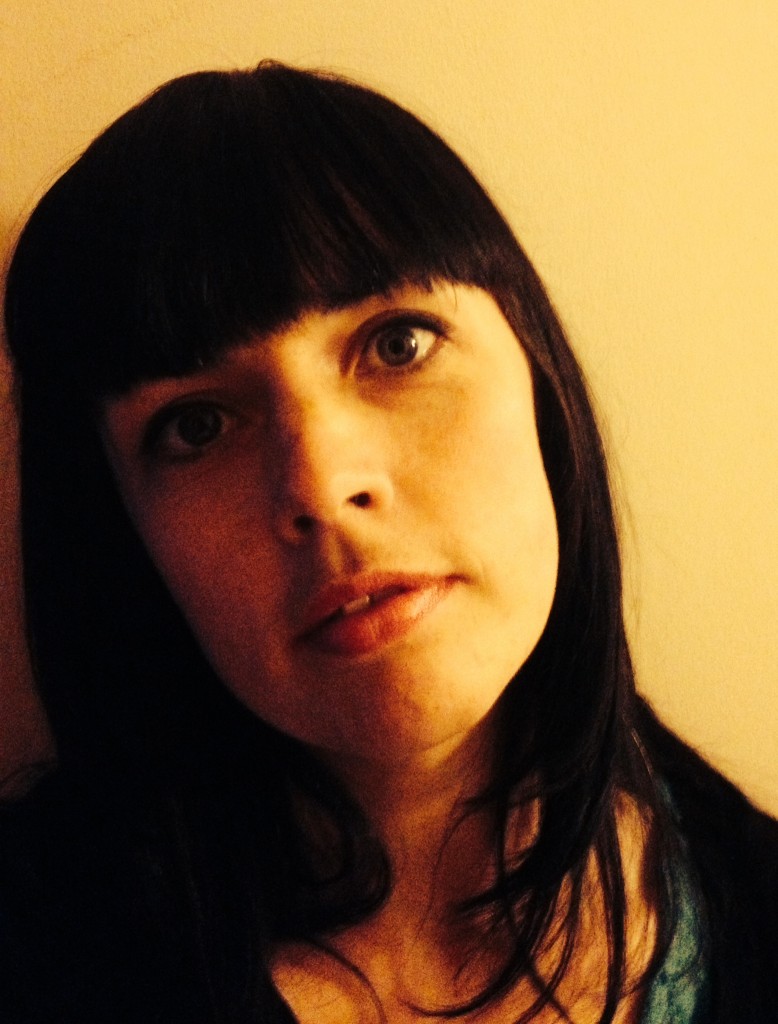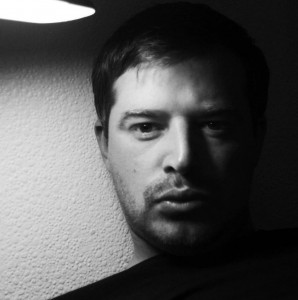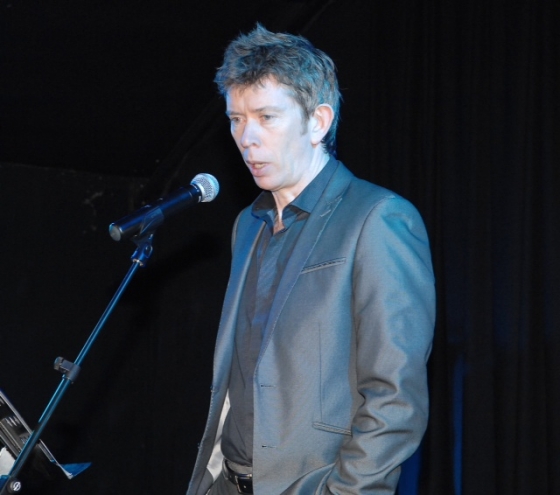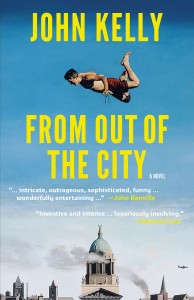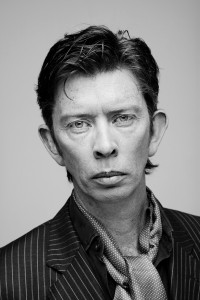With the publication of her intensely moving debut novel, Solace, Belinda McKeon quickly established herself as an important new voice in Irish literature. While we eagerly await the arrival of her second novel, Tender (to be released in March 2015), Uimhir A Cúig is delighted to feature her remarkable new story, “Route.”
Annie and Brendan have emigrated to the US from Ireland; however, as Annie recognises, “what they are is immigrants rather than emigrants.” A couple not so much leaving as arriving, but leaving what and arriving where? A couple who married in a church not necessarily because they wanted to but because they felt obliged to for their elderly relatives’ sakes – “just do the damn thing.” And what role does duplicity play in all of this – long ago lies, imaginary friends? Just what is left to believe in? The past, might be one answer, even if it is, perhaps, an imaginary past. McKeon takes us on this journey too. Where we came from and where we end up is just as uncertain as we, like McKeon’s characters, struggle to grapple with “the plentiful and illogical absurdities of the world.”
—Gerard Beirne
In a quiet moment, of which there are precious few, Brendan takes care to speak out of the side of his mouth. “Our table is very loud,” he says, flickering his gaze onto Annie’s, and Annie is proud of how good they have become at this surreptitious communication; is it marriage, she wonders, or is it just the whole emigrant business? Though, actually – and, if she’s honest, much less pleasingly – what they are is immigrants rather than emigrants, as their friends here are never slow to remind them, albeit always in the velvet case of laughter, always with the understanding that, since they are such good friends, they can poke fun at one another over anything at all. So: nothing like one immigrant population bitching on another. That was Rob – grad-school Rob, now barman Rob – to Annie, a few weeks ago, after she had said something about the Polish women in Greenpoint, about the way they glared. The way that sometimes, you caught them staring at you, sweeping their eyes over what you were wearing, as if to say, this has gone beyond a joke. As if to say, you people: how can you go out like this? And Annie sees something else in their eyes, too, something which, maybe, it takes one cor-faced Catholic woman to read in another, which is, You’re a bit long in the tooth for this messing, aren’t you? When are you going to cop yourself on?
“Don’t worry about it,” Annie mutters back to Brendan now, as they both pretend to be listening to whatever turn conversation is taking at the other end of the table. “People don’t notice it here in the same way.”
From his throat, a low, sceptical chord. He sips his Bloody Mary. “I don’t know,” he says. “I’ve seen a few people wince.”
Annie shrugs. “Let them wince. Nobody knows us here. So who cares?”
Brendan glances at her, and when he speaks, his tone is colder. “What’s that got to do with it?” he says. Brendan has views on this; Brendan does not think Annie should care about this thing about which Annie cannot cease to care.
“Nothing,” Annie says, shaking her head, but he knows, and she knows he knows, and so on, ad infinitum, and down where Martha and Jack are sitting, the decibel level is once more steadily climbing, as Martha teases Jack about something to do with football, something to do with the Jets, and it’s evidently a killer blow, a comical blow, because up goes the cry – EH-OH! – like something from a television show, and meeting it – AIYKK! – is a second roar of approval, of commendation, of glee. Jack holds his hands in the air as though defeated, and Martha bumps fists with Jessica, then with Tasleen. Opposite Annie sit Meghan, the birthday girl, and beside her, Liz, the only person at the table who has experienced parenthood, and who talks about it enough for all of them. That’s not fair, Annie says to herself, as soon as this thought arises. You had to ask her to see the photos. Hold your horses. Drink your drink.
*
Escarole salad, chilaquiles, pork and grits, baked eggs with leeks and truffles; this is brunch so elaborate that it might have come from some computer programme. And yet, so utterly par for the course; this is Smith Street, on a Sunday afternoon in October. The ten-dollar gin thing in front of Annie is called a Sleepy Hello, and she could tell from the first sip that she would need three if she was to get anywhere close to drunk. Which means that she is probably safe, as far as confessions go – though since confession is the word which has most readily come to mind, possibly not.
What would he say, Brendan, if she told him that less than an hour ago, as she headed for the subway after the gym, she walked up the steps of a church and she went right in? An instant previously, she had been admiring a stained-glass window, thrown open to the street, and the way it looked against the golden yellow brick of a building; but it had been an abstract, hazy sort of admiration – the smugness had still been uppermost, her real attention had been on the subway entrance across 7th Avenue, and on whether the lights would stay green long enough for her to get over there. And then, somehow, she had been on the steps. And then, somehow, she had been in the hall. She had been at mass. Near to it, or within reach of it, or lurking in the background of it, but however she put it, she had been there. Mass.
Or, service, actually, which makes it easier to take. It was a Methodist church, something Annie discovered herself to have already known as she walked into the hall, something she must have picked up from a sign or a noticeboard in between the yellow brick and the stained panes of glass. Methodist Church of Whatever. Methodist Church of The Village, she thinks it might have been, now. Or Village Methodist Church. One of those. Village, she imagines herself saying to Brendan.
So, it’s fine, she hears herself continue. It was Methodist. Or, better still, it was only Methodist; how about that for a nice spot of distancing and evasion? It was only Methodist, and I only stood in the hallway even though a woman – smiling, dreads, floral dress – invited me to go all the way in. I only stayed for ten minutes, and the preacher, who was female, and in her twenties, and wearing a Madonna headpiece, namechecked the Gay Men’s Chorus in her sermon, and I only stayed even that length of time because I could see that there were singers and a pianist on the altar, and I was curious to hear what they might sing, and when it turned out to be You Raise Me Up, I got out of there, and really, I only went in because I had a few minutes to kill.
The worry, of course, would be that he might not mind. Or, worse still, that he might somehow, actually, approve.
Annie stood in front of an altar with this man two years ago; beside this man she knelt there, on what turned out to be the excruciating-to-kneel-on beads of her dress; beside this man she prayed the prayers and rolled out the vows. They did this. They went there.
But everybody understands what this kind of thing is about. Everybody understands why this kind of thing is, sometimes, unavoidable. There are parents, some of them elderly, and elderly is code for just do the damn thing; everybody knows that. There are arguments, and because of just do the damn thing, you are too cowardly to get into those arguments, and besides, there is an aisle, and some part of you is hard-wired into thinking that only an aisle will do for walking up and for walking down. None of this is admirable. None of this is brave. But. There is no need to get carried away.
“How are the grits?” Brendan says, just seconds from finding out for himself, given that he is sliding a fork into the creamy mush on the side of Annie’s plate.
“Amazing.”
“Want to try?” he says, gesturing towards his own.
She shakes her head. “Stuffed,” she says. “Already. Here.” She pushes the small bowl of potato cakes towards him. He glances at her as though he does not dare hope.
“Sure?”
“Potatoes,” Annie says, giving the word the thick-tongued intonation she and Brendan give it when they say it here, as a joke. A joke that only they get, given that to everyone else, their accents probably sound exactly the same as always. “I’m sure.”
“Yay,” her 36-year-old husband says – her smart, sarky, word-whirring husband, he actually says “yay” – and he polishes them off.
*
Meghan and Liz are talking about children. Meghan earns money for taking care of them during the day, and Liz pays money to other versions of Meghan to do the same thing. They have been talking, they tell Annie, about how extremely good their kids – Meghan’s charges and Liz’s daughters – are at lying. They are pros, apparently; unblinking, unwobbling pros, and already Liz’s youngest, at sixteen months, is showing signs of being the slyest of them all.
“I’m doomed!” she says, smiling as though this is the most delicious prospect in the world. “I’m completely doomed!”
“But every child lies, don’t they?” Annie says.
Meghan looks at her blankly.
“Come on,” Annie says. “Didn’t you?”
Meghan opens her mouth as though to respond, then just twists her lips and gives Annie a slight shake of the head.
“I don’t believe you,” Annie says. “I think you’re lying now.”
“Uh-uh,” Meghan shrugs, twirling her straw and casting her gaze out to the street. “I’m not. I just never needed.”
She is blonde, and petite, and pretty the way a girl on a poster for dental floss is pretty. When she is not minding children, she writes essays on urban space and eco consciousness and on the city of the future, which is a place, from the way she’s described it, in which Annie is not sure anybody is going to want to live. Who, Liz’s little liar, grown up to be ultra-cognisant of others? A likely story.
“I lied like a sailor,” she says, aware that the simile is wonky, and she takes a big swig of her elderflowered gin. “It came to me so naturally that a couple of times I actually shocked myself.”
“Like when?” Brendan says, beside her, and she almost jumps; she had, somehow, almost forgotten that he was there. Not that it would have made any difference, not that she would have told a different story, but still. Her declaration was for Meghan’s sake, and for Liz, who has still not shown her own hand where duplicitousness is concerned, but who scarcely needs to; wee Victoria has not licked it off the ground.
“Like, too many times to remember,” Annie says, giving Brendan a playful nudge. “But a long time ago. Not lately.”
Brendan arches an eyebrow at her. Then he laughs, and they all sip their drinks and make what headway remains to be made of their food, and as Brendan puts some chorizo on Annie’s plate – she has to try it, he says, to her protests, she has to take just a bite – he asks whether either of the girls ever had any imaginary friends.
Liz shakes her head, exhaling a light laugh, but Meghan’s expression suggests that she regards this as a trick question. “Imaginary?” she says, and she tilts her head to one side. “Like, people you pretend are there?”
“People you pretend are there,” Brendan confirms, nodding, and suddenly, Annie realises where this is going. “Or,” he says, “people that other people think you’re pretending about. Until they discover otherwise.”
“What the fuck are you talking about?” Liz says, deadpan.
“No, no,” Annie says, shaking her head at Brendan. “We’re not…”
“Come on,” Brendan says. His grin is boyish, enthused.
“What’s going on?” Meghan says, holding her fork in mid-air. “Is something going on with you two?”
“Annie has a story about an imaginary friend,” Brendan says, still grinning.
“Jesus,” Annie says to him. “I haven’t thought about that story in, I don’t know, fifteen years.”
“Tell us!” Liz says, looking to Meghan for back-up, but Meghan just continues to switch her gaze from Brendan to Annie.
“It’s stupid,” Annie says. “I don’t even think I believe it anymore.”
“You said you knew the girl, didn’t you?”
“She was a friend of a friend,” Annie shrugs. “But I heard something since…I don’t know,” she says, shaking her head. “I can’t even remember it properly.”
“You can remember it perfectly bloody well,” Brendan says, and he turns to Meghan and Liz. “So,” he says. “A friend of Annie’s. A friend of a friend.”
“In Ireland?” Liz says.
“In Dublin,” Brendan nods.
“Ok,” Liz says, as though this somehow adds an extra layer of credence. “Ok.”
“She was babysitting,” Brendan says, and he nods towards Meghan, whose face twitches as though she has been outrageously accused in the wrong, “looking after this little boy. And…” he nods towards Annie. “And…”
“Oh, for fuck’s sake,” says Annie, and she takes a mouthful of Sleepy Hello, and she gropes for the story as she was told it by her flatmate Gemma in Phibsboro twelve or thirteen years ago, one night when they’d had whiskey and when every story about everyone they’d ever known seemed to be pushing to the surface and heaving itself out onto the floor between them. Gemma; where is Gemma now? Married too, and with a couple of kids, and with the negative equity that is as tightly woven into their generation’s existence as email, or Ikea, or kale. “I didn’t really know this girl,” Annie says, and Brendan makes a noise that says, get on with it, don’t be trying to wriggle out of it, and Liz looks at Meghan and Meghan looks down the table towards the other conversation, the conversation that is still, impossibly, about football, and she looks back.
“So, she was minding this kid. And his parents told her, you know, little…”
“Jasper,” says Brendan, nodding very gravely.
“Jasper?” says Annie. “Jasper was not the child’s name. But anyway. The parents told her everything she needed to know about looking after him. Where his food was. Whatever.”
“Where his food was?” Liz says, laughing. “Are you sure she wasn’t looking after a cat?”
“She saw the imaginary friend,” Meghan says abruptly. She shrugs at Annie. “Right?”
“She saw him?” Liz says, holding up a hand for silence. “Sorry, explain this to me. She saw what?”
Meghan is frowning. “Isn’t this a movie?” she says. “Doesn’t this…”
“The Sixth Sense?” Liz says impatiently. “But nobody saw him!”
“This is pointless,” Annie says to Brendan, and she lifts her glass. It is almost empty. She sucks loudly through the straw.
“You might as well finish it,” Brendan says. “The story, I mean.”
“I’m not going to finish it,” Annie says. “They know what happened.”
“I don’t know what happened!” Liz protests, a hand on Meghan’s arm. “I want to hear the rest of the story!”
Annie sighs. She remembers the shock of this, from when Gemma told it to her in that basement flat where the heating always took forever to come on; she remembers the genuine chill which dropped down her spine when Gemma came to the big reveal. A gunk, that was what her mother would call it; she got a gunk, and for weeks afterwards – it was so silly, so embarrassing, she was afraid to look at a window after dark, for fear of what she might see reflected there. A broom handle, a cheap old table, a fridge door covered with novelty magnets and unpaid utility bills; that was what she would see. But she didn’t look. Not for ages.
“The parents told this girl that the child had an imaginary friend, just so she’d know, if she saw the child talking to himself, not to worry, that this was the reason, and it was perfectly normal, and cute, and blah,” she says. “And sure enough, she did notice the kid making occasional comments to the space beside him, and she tried to be nice, to interact a little bit with the…friend – to ask him questions, or to ask the kid questions on the imaginary friend’s behalf. That kind of thing.”
“Bad move,” Meghan says. “Never patronise the imaginary friend.”
“Yeah, well,” Annie says, suddenly determined to maintain control. “That’s as it may be. So. She gets through the evening, and the kid is well-behaved, and he puts his pyjamas on, and he gives her no hassle, no hassle at all, and he’s quite content just to go up to bed. And as she’s reading to him – “
“Oh no, no, no, no,” Liz cries, covering her ears.
“Hang on,” Annie says, pointing to her. “Not yet. As she’s reading to him, the kid is making occasional references to the friend. Asking him questions, explaining stuff to him, that kind of thing. And it’s fine, and she goes along with this, a bit, and when she’s saying goodnight, she makes sure to say goodnight to the imaginary friend as well. And.”
“Oh god,” Liz says, hands to her ears again.
“Oh, for Christ’s sake,” Meghan says.
“And later that night,” Annie says, and now she realises that she does not want this story to end, that she wants to keep stringing them along like this, even Meghan, who is trying so hard to look as though she does not care for a word of it. There is more of her father in her than she thought, Annie realises, her father who loved nothing more than to keep them all up at night, scaring the life out of them, telling ghost story after ghost story, her father who was never as happy as when he had an audience, attention, an atmosphere that felt like approval, even if it was only actually a hunger for distraction. Lately, it has felt as though she is having discoveries like this every day. Lately, too, she has been opening her mouth, and saying something – something to Brendan, usually, because it is with him that her intonation is at its less contrived – and hearing, quite clearly, that it is not her own voice, but her mother’s voice which has come into the room. It is not a mystical thing, this phenomenon; it is to do with aging, and timbre, and genetics – nothing more mysterious than that, nothing more poetic. And yet.
“Later that night,” she says, “the babysitter goes upstairs to check, say at 9 or 9.30 or something, whatever time a four year old boy is meant to be long asleep by, and she hears him chatting in his room. And she says to herself, right. Enough is enough. And she opens the door. To say, time to go to sleep now…Jasper. Time to say goodnight to friendy there and close your eyes.”
She pauses. Even if the story is ruined, there is nothing wrong with a pause.
“And he’s there.”
“Oh my fucking God,” Liz says, hands to her mouth. “Who’s there?”
“The friend is there,” Annie says, and she laughs with true delight at Liz’s reaction. “Sitting at the bottom of the bed, looking around to see who’s disturbing their conversation. Looking her right in the eye.”
The people at the next table register only mild irritation at the jump in noise levels; Liz’s shriek is at least over with quickly. Beside her, Meghan is adamantly shaking her head, talking about how this is a movie, how it is definitely a movie. Brendan drapes his arm around Annie’s chair, and she leans into him; they are laughing, they are enjoying themselves, this is effortless, this is fun. Which is how Annie comes to sit up straight, suddenly, and look at Brendan, and say, while the soundtrack of Meghan’s cynicism and Liz’s horror is still unfolding, that they should tell them the other story, the one about the guy on the road, and she knows as soon as she has said it that Brendan has gone into a different place now, that Brendan is not interested in playing this game anymore, that Brendan does not want to be at a brunch table with the Annie who would tell this story – but no, it is not even that, she sees, pushing her hair back from her face and looking, unsmiling, at him as he looks, unsmiling at her; it is that he does not want her to be an Annie who would believe this story, who would drag it up again and thereby prove to him that she has not listened to him when he has told her to let go of it, to see sense on it, to understand that it is not, and cannot be, the story she for some very worrying reason so fervently maintains it to be.
She gets it; he looks at the Annie for whom this story is a real one and he wonders if he knows her at all. If he is right about who she is. If he did what was wise, after all, standing with her in front of that altar, listening to those prayers for their future blessedness and fecundity, tolerating the doggedly old-school priest who told them to keep the Blessed Mother and her saints in their home always, to make a place for her, presumably, in between the imitation Eames and the Crate and Barrel lamp and the black and white films they send flickering up onto the wall from their fancy, ugly, clunky projector, that horrible piece of office equipment which allows them to bring Bogart and Hepburn and Jimmy Stewart into their living-room, large as the night, whenever they please.
Annie, Annie hears her mother’s voice say. Watch what you’re saying. But Annie is angry with her clear-sighted husband, by now, and Annie will tell the story of the old man on the side of the road if she damn well pleases. So she tells them, and this time, Meghan does not disguise her interest, and this time, the noises that Liz makes are of a different kind, and this time, the others at the table listen too, and if Annie is not mistaken, the couple at the table beside them are angling their ears in her direction as well.
It lays its track down easily; their last week in Ireland before moving here, the pressure to visit everyone, to say to cousins, and aunts and uncles these formal goodbyes, as though they would see them any less often than they had while living in the same country as them. This was before the recession, so the term had not yet come back into currency, the term that everyone who emigrates is using now – the American wake, or the Australian one – fair enough, Australia is a long bloody way away – or the London wake, which is just silly, which is clearly just an excuse for a piss-up and a chance at a few good luck cards stuffed with twenty-euro notes. Annie and Brendan had used the term too, but with what they thought of as hilarious irony; nobody really saw it that way, they knew, and all of that was so long ago now, all of that suffering and misery, that it was absolutely fine to joke about it, and their going-away party was a laugh and a bit of a bragging opportunity all at once. But the visits; the visits were a chore. Driving to Galway and Cavan and Roscommon; cups of tea and ham-and-tomato sandwiches, and beer that Brendan could not drink because he had to drive back again, and the same questions, and the same answers, and the same old lines. They had done it because their parents had expected them to do it. It had not occurred to them to say no, no thank you. The inkling of such a possibility was only beginning to occur to them now. Now that it only half-mattered anymore; now that their parents were one-half gone.
It was August, so it was still light out at half-nine or so, which was when they were heading to Annie’s cousin’s house, and this cousin lived up the Arigna mountain, so the roads were tight, and steep, and winding, but Brendan knew this country well – Brendan had grown up close to here, had come these roads with his father and the cattle lorries – and Brendan was driving as Brendan usually did. They were talking, letting off steam about whatever visits they had been required to undertake already that day, and they were listening to the radio, to the arts thing on Radio One. And it was on a straight stretch of road that they met him, and he was just as she remembered him, insofar as she could remember him at all.
He was then, perhaps, twenty-five years dead.
She knew it was in and around that, because of the way the memory of his funeral was held in her mind; it was all angles and shadows, with no sense of human expression, no trace of how an emotion had looked, taking over an adult face, which was something she could remember from later funerals, the strangeness of a man’s weeping, or of her mother’s weeping, for that matter. This one, though; too early for that. Those pictures in her mind were made up of pew backs and of knees and of the slant, high up, of the ceiling; that had been her perspective on the world then, which meant that she had been three, maybe four years old. Jodie had been their neighbour; her neighbour, the old man who lived in the tin-roofed house up the lane, who chatted to Annie, who treated her like a neighbour no matter how tiny she was, how frightened she was of his greyhounds. Annie’s mother brought her up to visit him almost daily, and the three of them talked – it was like that, it was not Annie’s mother and Jodie talking over her, or down to her, it was the three of them talking, and then Annie and her mother talking some more as they walked down the lane again afterwards, or sometimes, Jodie walking her down. And when she saw him on the mountain road that evening, she had recognised him instantly, before ever it entered her mind that such a thing was an impossibility.
“I said to Brendan, long before we went around that corner, I said to him, hey, that’s Jodie. I hadn’t even registered that it couldn’t be him: I just saw him, and that was that.”
“You never know with these things,” Brendan says now, and his voice is wary. He tries to touch Annie’s hand.
“I saw him,” Annie says, almost savagely, and she pulls her hand away.
Someone says it: “Eh-oh!”.
“He lifted his hand, as though he was telling us something, and I said to Brendan, I said, Jodie, and he said, Jodie who? And I said, slow down. And he said, why, do you want me to stop? And I said no, just slow down, just slow down. And he did. And when we came around the next corner…if we had been going any faster…”
“There was a guy in a tractor, cutting a fucking hedge,” Brendan says with a grimacing shake of his head. “With a hedge-cutter; he was taking up our whole side of the road…but…there was room – I would have been able to brake…”
“You would not have been able to brake,” Annie says, and she looks to Meghan and Liz, to the others at the far end of the table, for support. They stare back at her, eyes wide, faces deadly serious.
“He saved you?” Liz says, right on cue.
“He saved us,” Annie nods, and to the noise of Brendan’s heavy sigh, she does not even turn her head.
“Irish roads,” says Meghan, reaching over Liz for the water jug. “Rather you than me, by the sounds of things.”
*
Presumably, Annie thinks as she sits on the bus later – alone – these recorded messages are played over the tannoy at random; presumably, the driver has nothing to do with it. The driver is just making his way from Greenpoint to Prospect Park, doing battle with all those shining, chubby SUVs, watching as his passengers haul themselves up his steps, as they dip their Metrocards into his machine; listening for the right kind of beep. He’s doing his thing, and then somewhere along the line – he doesn’t know where – the recording jolts itself on, and the bus is filled with the voice of a guy who could be at the Academy Awards, asking the audience to please welcome some hugely famous, greatly beloved actors, such is this guy’s drama and intensity, such is his sense of this as a moment when all ears ought to be his, all attention locked with full focus and reverence on what he has to announce: that assaulting a New York City bus driver is a crime. Annie looks around, but nobody else on the bus seems to be paying the voice the slightest heed; they are still absorbed in themselves, or in one another. Gazing out the window at Crown Heights, as it slugs past, all bodegas and clothes stores and worship halls and hair salons. Listening to each other; debriefing one another after another day. Listening to their music, whatever it was; nodding so deeply, so slowly that no degree of dead-eyed stare could convince the observer that here was anything less than vivid life, engaged and excited life. Annie looks at them, her fellow passengers, and she realises that what she is trying to do is to catch someone’s eye. To find someone, in that instant after the syrup-voiced warning has played over the speakers, with whom to connect laughingly, wryly, with whom to make wisecracks about the announcement and how comical it is, coming the way it does, coming with that camp flourish, that elegant timing, as the bus slams and rattles its way along Utica or Nostrand.
“Sure, we’re not going to do anything to him,” Annie imagines herself saying, pulling her face into a comical expression, while her interlocutor nods, and laughs, and sends her eyebrows high towards her hairline. Her interlocutor will be a woman, a woman in her 50s, Annie decides: a teacher, or someone who works in a hospital, something like that. She will be black, because everyone on this bus is, except Annie, and she will take absolutely no shit; she will be in full agreement with Annie about the plentiful and illogical absurdities of the world. Sure, we’re not a bit interested in you, love, Annie hears herself continuing, and the woman will nod and laugh and move her head in accord. That’s right, maybe she will say – That’s right, Annie feels reasonably sure, is a good approximation of what a woman like this would say – and she will smile a purse-lipped smile – not unlike Annie’s mother’s smile – and her eyes, her eyes will be beautifully bright. Mmm-hmmm, she might then say – another sound that Annie can hear in her head, a sound she feels sure to be the right sort of one, at least – her agreement emphatic, her enjoyment of the joke intense; Sure, we have better things to be doing than assaulting that lad, Annie might go on to say. “That lad”: so Irish, so much of Annie’s part of the country, but these kinds of descriptions are the same the world over, and she is certain the woman will see her meaning without any snag. Then the woman will laugh in a final confirmation of pleasure and approval, and Annie will shake her head and say, Oh, well, and the two of them will go back to their business. And, have a nice day, or you have a nice day, now!, whichever of them – probably Annie – will be first to stand up and press the cord for the stop to come.
—Belinda McKeon
Belinda McKeon is the author of Solace, which won the 2012 Faber Prize and was named Irish Book of the Year as well as being shortlisted for the James Tait Black Prize. She has contributed to publications including the New York Times, the Paris Review and the Guardian, and is also a playwright. Her second novel, Tender, will be published by Picador in April. She teaches at Rutgers University. Her website is www.belindamckeon.com
.
.
